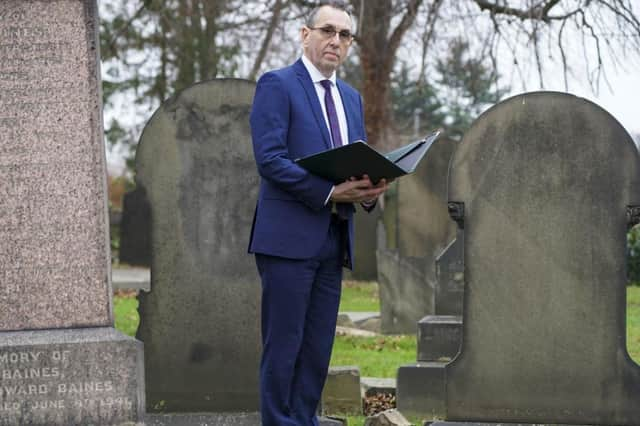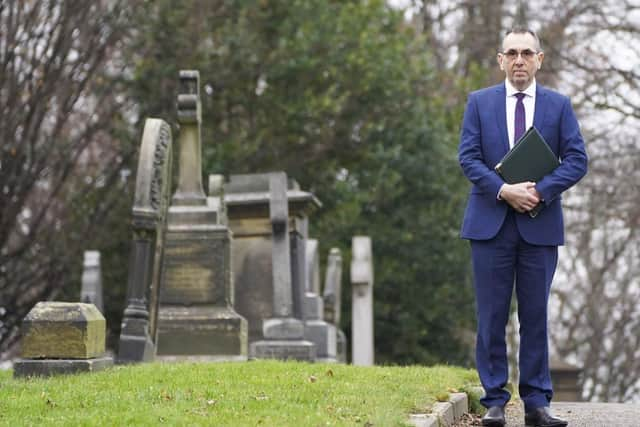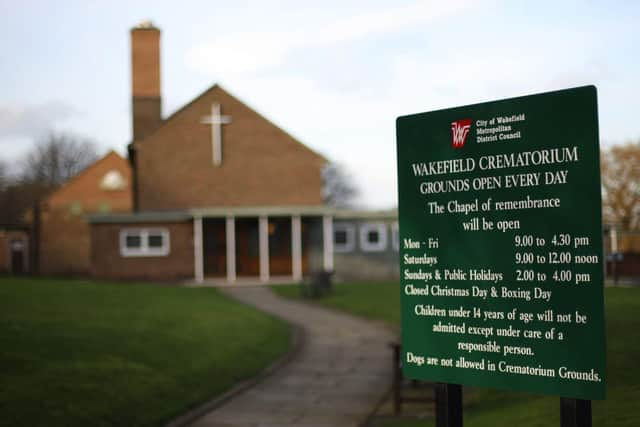How celebrant Wakefield councillor is shaping the future of funerals


We’d rather not talk about them, let alone attend them, but imagine wanting to give up your time to preside over them?
Darren Byford is more commonly associated with his role as a cabinet member on Wakefield Council, but he also leads around one funeral a week.
Advertisement
Hide AdAdvertisement
Hide AdBut that doesn’t make him a minister. Nor does he have any involvement in the church for that matter. He is, in fact, a funeral celebrant.


Religion is unquestionably playing a reduced role in people’s lives these days, so to avoid any hypocrisy, are more people choosing an alternative way to say their goodbyes?
“I’d say it’s about 50/50 now,” says Darren.
“When I take services at the crematorium, I’d say usually those taking the services are mainly by celebrants from what I see, rather than ministers.
“I know some celebrants who are taking four a week. It’s a full-time job for them.
Advertisement
Hide AdAdvertisement
Hide Ad

“I perhaps get about one a week now, the Co-op ring me and pass on a family’s details.”
Having qualified two years ago, Darren has presided over 70 funerals. He has even won an award for his efforts.
But Darren, who is now 60, admits it wasn’t so much a calling, but something he happened to stumble across. Public speaking comes second nature as a councillor, and he admits there are “a lot of a parallels” with being a celebrant.
“A few years ago a work colleague passed away, she knew she was dying, I’d known her for a long time, and she asked me to say a few words at her funeral,” he explained.
Advertisement
Hide AdAdvertisement
Hide Ad“Then another friend passed away, and I said a few words there, so I thought ‘I can do this’.
“I have never been religious, but I like talking to people.”
Signing up for an intense course in Leeds, he has became a member of the Fellowship of Independent Celebrants.
Many often describe them as ‘humanist’ funerals, void of any religious connection, but Darren insists the families can choose prayers or hymns should they wish.
Advertisement
Hide AdAdvertisement
Hide AdThe services often become more a celebration of life, rather than marking a death - perhaps another reason why many are choosing celebrants over the traditional church funerals.
But it’s not a case of turning up on the day armed with a generic script, Darren can spend hours talking with the families, teasing bits of information about the deceased’s life to add to the service.
And music often plays a important part, from tongue-in-cheek tracks to ear-blasting thrash metal.
Even technology can play a major role these days, with Covid still restricting many, the services can be live streamed over the web.
Advertisement
Hide AdAdvertisement
Hide AdHe has even had someone deliver a speech at one funeral over the phone that was held up to the microphone.
“Anything is possible,” said Coun Byford, a former procurement manager.
“Whatever they want, they can have.
“You have to remember the customer is not going to argue, but their family will remember this for a long time.
“It’s a case of listening and finding out exactly what they want.
Advertisement
Hide AdAdvertisement
Hide Ad“Some want a traditional service but others want something different.”
He gained his celebrant qualification after an intense four-day course in Leeds.
Run by the FOIC - the Fellowship of Independent Celebrants -they offer training for people wanting to take various ceremonies, including weddings and funerals.
The company says it trains people up to understand “modern-day trends” when it comes to weddings and funerals that include burials and cremations by fire and water and internment and scattering of ashes.
Advertisement
Hide AdAdvertisement
Hide AdOnce completed, the celebrant will receive a qualification recognised by the government.
On the company’s website, founder and CEO of the FOIC, David Abel, says of potential celebrants: “You will be shown how to cope with families’ grief and anxiety as they experience perhaps one of the most difficult, challenging and stressful situations of their lives.
“They (celebrants) are making a significant difference and are creating positive change in the way ceremonies are conducted in the UK today.”
For Darren, he sees it as a challenge.
He said : “There’s an opportunity for stories, to put smiles on faces.
“It really doesn’t have to be a sad affair.
Advertisement
Hide AdAdvertisement
Hide Ad“It fits in with people’s lifestyles these days, it’s more functional and more related to them.
“It’s wrong to say I enjoy it, but I get a real satisfaction out of doing them. When people leave at the end they often look me in the eye and thank me, it gives you a warm feeling.”